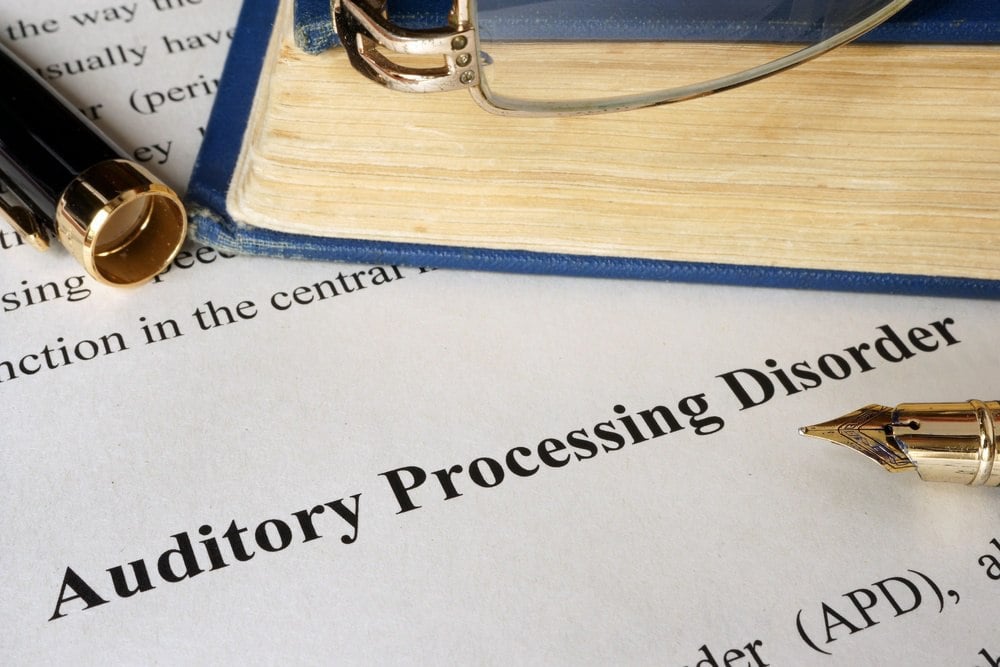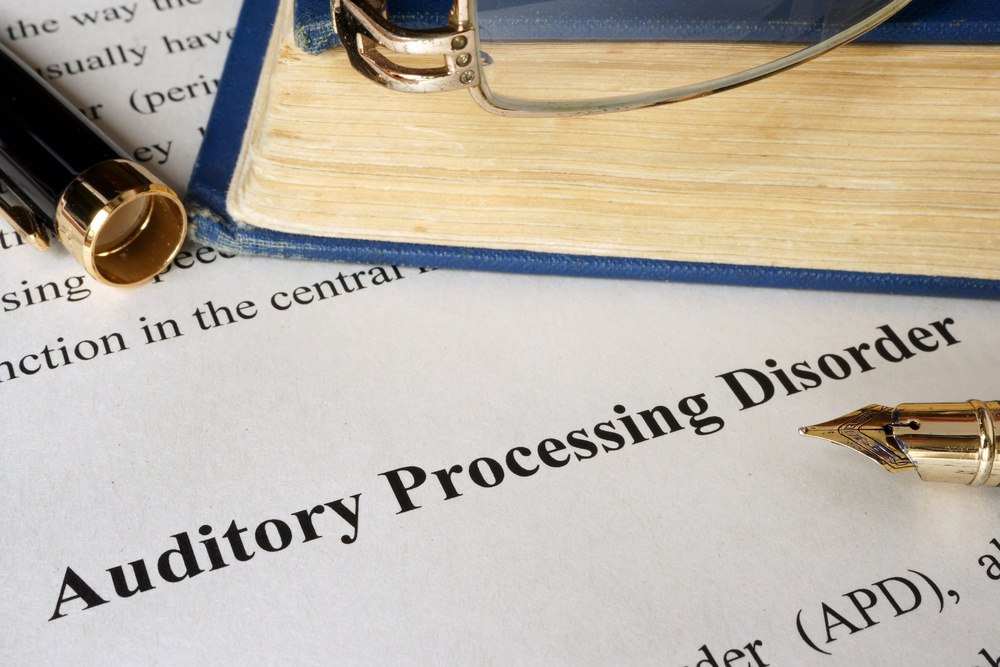What Is Auditory Processing Disorder? ( Symptoms and Treatments)
May 3rd, 2018 | 5 min. read


Auditory processing disorder (APD) or what doctors also refer to as central auditory processing disorder (CAPD), is a type of hearing issue that affects children during their school-age years. It also affects adults. According to a study published in the Journal of Otology, there's a two to five percent prevalence rate of auditory processing disorder in school-aged kids — 23 to 76 percent in older adults.
Auditory Processing Disorder Definition
Individuals with APD don't identify the subtle distinction between word sounds, despite sounds being clear and loud enough to hear. The individuals often find identifying where sounds are coming from challenging as well. They have difficulty in blocking competing background noises out and understanding the order of sounds.
Younger kids have an extremely difficult time taking in information verbally. Although nothing's wrong with their hearing, they still find it difficult to register what others are saying or registering it correctly, as well as remembering what they heard. It's hard for them to clearly express themselves or learn to read since they confuse different word sounds.
They ask people to repeat themselves often or tend to "miss things" in conversations. Doctors know the patient's ear can hear the signal and is attending to the auditory data through testing. It's just that the brain of the individual isn't assigning the correct meaning or any meaning to that signal.
Numerous adults describe living and communicating with APD as "garbled." APD makes it hard for them to interpret and understand information orally presented to them. APD in adults can manifest as:
-
Poor reading comprehension
-
Poor listening skills
-
Miscommunication causing problems with partners, coworkers and friends and family
Living with APD, for many individuals, is like listening on a phone and having the signal cut in and out.
Both adults and children whose APD issues haven't been identified and treated have to come up with their own solutions. The behaviors that result can cover up the real issue and complicate relationships, work and school. Receiving advice like "Listen," "Pay attention," or "Don't forget," doesn't help either.
Auditory Processing Disorder Symptoms
Many APD symptoms are the same for both children and adults, including:
-
Challenges with understanding speech in rapid talkers
-
Challenges with understanding speech in reverberant or noisy environments
-
Challenges with understanding information presented verbally
-
Challenges with following spoken directions
-
Frequent "mishearing" that involves similar-sounding phoneme substitutions like "dime" for "time"
The differences between adults and children are how the disorder impacts their day-to-day life. In children, there's a whole range of educational difficulties and learning and language implications.
In adults, who presumably completed their education and acquired language, APD's impact on day-to-day life is more likely to exhibit itself in the workplace and in social communication. But, those adults with the disorder who go back to school pursuing a degree often face learning-related challenges quite similar to the challenges school children with the disorder face.
Symptoms of Auditory Processing Disorder in Children
If you're a parent of a child you suspect is having trouble processing sounds, start by asking yourself some specific questions such as:
-
Is your child unusually bothered or easily distracted by sudden or loud noises?
-
Does your child find it difficult to follow directions — whether complicated or simple?
-
Does your child's performance and behavior improve when in quieter environments?
-
Do noisy environments upset your child?
-
Does your child have difficulty following conversations?
-
Does your child have difficulty with writing, reading or spelling or have other speech-language challenges?
-
Is your child forgetful and disorganized?
-
Does your child have difficulty with verbal (word) math problems?
Since the APD behaviors above often accompany other conditions like attention deficit hyperactivity disorder (ADHD), depression and learning disabilities, it's often misunderstood.
If you suspect your child is struggling to hear or understand others when talking, book an appointment to have an audiologist see your child. Audiologists are hearing specialists and are the only doctors who can diagnose APD.
Symptoms of Auditory Processing Disorder in Adults
Common APD manifestations in adults include:
-
Although you try and want to listen to your partner's requests, they're often upset with you for "not paying attention" to what they ask you for
-
It's hard to understand what's going on in different television shows despite having it turned up to full volume
-
You have a hard time navigating around town
-
You can't remember people's names after meeting them
-
You can't remember what you had on a grocery list when you leave at home
-
You're not sure what's going on when in a noisy bar or out with friends
-
You find it difficult to remember and follow multi-step instructions
-
You have difficulties understanding coworkers clearly when you're speaking with them in the cafeteria or other "busy places"
-
You often make "careless" or "silly" mistakes like subtracting instead of adding
-
You rely on the spell-checker
Have a speech pathologist or audiologist give you a formal assessment if you're experiencing these APD symptoms.
Auditory Processing Disorder Treatment
Treatment isn't that different between children and adults.
Children
APD treatment typically focuses on three main areas:
1. Changing the communication or learning environment
2. Auditory deficit remediation
3. Engaging higher-order skills to make up for the APD
The main goal of modifying the environment is to make auditory presented information more accessible to your child. Recommendations might include using teacher-oriented recommendations to improve information delivery, using electronic devices that help with listening or other techniques that alter the learning environment so your child can concentrate on the message.
Remunerative methods typically consist of recommendations for assisting listeners to strengthen central resources to use for overcoming the APD. These central resources may include:
-
Memory
-
Language
-
Cognitive skills
-
Attention
-
Problem-solving
Also, many remunerative methods teach kids with the disorder to take responsibility of the success or failure of their own listening and to actively participate in day-to-day listening activities through a range of problem-solving and active listening methods.
There's also direct APD treatment to correct the condition, itself. A whole range of treatment activities exists for addressing certain auditory deficits. For instance, some activities may involve one-on-one therapist training; others may be computer-assisted. While some might require the child attend their therapy sessions through a local clinic or at school, there are also home-based programs that may be more appropriate for your child. Regardless, the child's treatment plan needs to be programmed and highly individualized for their specific type of APD.
Doctors can't determine in advance the degree of improvement therapy will provide for your child's auditory deficits. Some kids with the disorder experience total improvement of their deficits or they simply "grow out of" their APD eventually. Other kids, however, experience some residual degree of deficit for the rest of their life.
But, children don't need to be victims of their impairments since appropriate treatment and therapy helps children with the disorder learn to actively participate in their own learning, communicating and listening instead of remaining helpless.
Adults
Like with children, for adults, treating and managing their APD has three essential components.
1. Remunerative methods to strengthen central resources higher-order like attention, language and memory.
2. Environmental modifications to make auditory input accessible.
3. Direct remediation activities to reduce or eliminate the auditory impairment.
Also, like with children, treating and managing adult APD needs to be individualized and based off correct diagnosis of the nature and presence of the condition. Although doctors may recommend certain environment-based methods like choosing a listener-friendly area and making use of visual cues, these are your starting point.
While treatment for APD does focus on direct auditory training activities for specific deficits made to reduce or eliminate the impairment, until doctors understand the nature of the patient's APD, they can't recommend the appropriate activities.
If you suspect you have or your child has an auditory processing disorder, contact us here at Houston ENT & Allergy by completing our contact form or by calling us at 281-649-7000.
Mark Lynn Nichols, M.D., received his Bachelor of Science degree with Honors in Pharmacy in 1983, prior to his entering the University of Texas Medical Branch, Galveston, Texas, where he received the degree of Doctor of Medicine with Highest Honors. Following his Internship in General Surgery, and Residency in Otolaryngology at UTMB, Dr. Nichols did a Fellowship in Otology-Neurotology at the Ear Research Foundation, in Sarasota, Florida. He is a member of several professional associations, and is a Diplomat of the American Board of Otolaryngology.
